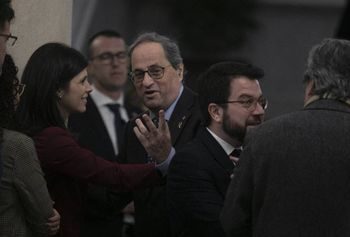
Forming a government in Spain will be more complicated than ever following the inconclusive repeat election on Sunday, which delivered big gains for the far right and left the winning Socialist Party (PSOE) with 120 seats, 56 short of a parliamentary majority.
The arithmetic of the election produces several possibilities for getting the caretaker prime minister, Pedro Sánchez, returned to office. But politically, most of these combinations are highly unlikely.
“Very soon we will be in a position to make an offer of dialogue,” said Carmen Calvo, the deputy prime minister in the caretaker administration of Pedro Sánchez, on the radio station Cadena SER on Monday.
But there seems to be no easy options in a fractured parliament where the next prime minister will first need to secure endorsement for his new government at an investiture vote to be held in the coming weeks.

Possible majorities
Absolute
majority
176
Total seats
158
180
170
208
100
152
218
170
PSOE + UP + MP
PSOE + UP + MP + PNV + BNG +
CC + PRC + Cs + TE
PSOE + UP + MP + PNV + BNG +
CC + PRC + TE
Ciudadanos + NA+ + PP
Ciudadanos + NA+ + PP + Vox
PSOE + Cs + PP (Abstención)
PSOE + UP + MP + PNV + BNG +
CC + PRC + TE

Possible majorities
Total seats
Absolute
majority
176
158
180
170
208
100
152
218
170
PSOE + UP + MP
PSOE + UP + MP + PNV + BNG +
CC + PRC + Cs + TE
PSOE + UP + MP + PNV + BNG +
CC + PRC + TE
Ciudadanos + NA+ + PP
Ciudadanos + NA+ + PP + Vox
PSOE + Cs + PP (Abstención)
PSOE + UP + MP + PNV + BNG +
CC + PRC + TE

Possible majorities
Absolute majority
176
Total seats
158
180
170
208
100
152
218
170
PSOE + UP + MP
PSOE + UP + MP + PNV + BNG +
CC + PRC + Cs + TE
PSOE + UP + MP + PNV + BNG +
CC + PRC + TE
Ciudadanos + NA+ + PP
Ciudadanos + NA+ + PP + Vox
PSOE + Cs + PP (Abstención)
PSOE + UP + MP + PNV + BNG +
CC + PRC + TE
Source: Ministerio del Interior

The easiest option in terms of the math would be a combination of the PSOE and the Popular Party (PP), which improved on its dismal results of April 28 to win 88 seats on Sunday. But this scenario, which would yield well in excess of the 176 seats required for an absolute majority, seems highly improbable. On Monday, the PSOE’s organization secretary, José Luis Ábalos, rejected the notion.
“We are not going to bank on a grand coalition with a political right that does not accept its share of responsibility,” he said after a meeting of the PSOE executive committee.
Very soon we will be in a position to make an offer of dialogue
Caretaker Deputy PM Carmen Calvo
Some voices within the PP, however, seem to favor at least allowing the PSOE to form a government by abstaining at the investiture vote. “I hope that all political forces will exercise utmost responsibility and not exclude any options on the table,” he said, adding that “the PP could abstain in order to quickly facilitate a PSOE government.”
If the center-right Ciudadanos’ 10 representatives backed a PSOE government and the PP’s 88 lawmakers abstained, it would produce 130 affirmative votes, and Sánchez would then need just three more endorsements from small regional parties to get himself returned to office in the second round of the investiture vote, which only requires more yes than no votes (the first round requires 176).
But the PSOE is not hopeful about this scenario. “We can’t expect a PP abstention; their margin is very small and it looks like they won’t do it due to pressure from the far right,” said Ábalos.

On Monday, Miquel Iceta, the head of the Catalan Socialist Party (PSC), warned other parties against blocking a PSOE administration. “Whoever votes no to Pedro Sánchez’s proposal will be voting with Vox,” he said.
Other options
Sánchez’s failure to secure enough support after the April 28 election led to the repeat vote on Sunday. Turnout was 69.9%, down from 75.5% in April, reflecting voter apathy and frustration at politicians’ inability or unwillingness to strike deals.
Ábalos said on Monday that “our commitment is to make sure there isn’t a third election, but a progressive government.”
In order to get himself back into office without relying on the PP, Sánchez could attempt to secure support from the leftist Unidas Podemos (UP, 35 seats), from its offshoot Más País (MP, two seats), from Ciudadanos – which suffered a stinging defeat on Sunday, losing 47 seats out of the 57 it won in April – and from various regional parties from the Basque Country, (PNV) Canary Islands (CC), Teruel (TE), Cantabria (PRC) and Galicia (BNG).
Such an endorsement would save Sánchez the trouble of having to ask the Catalan Republican Left (ERC), a separatist party with 13 representatives in Congress, to support him or at the very least abstain at the investiture vote.
Ábalos also suggested that the Socialists are not entirely closed off to a joint executive with Unidas Podemos, as was the case after the April election, when Podemos leader Pablo Iglesias unsuccessfully lobbied for a coalition government with Sánchez. “We are open to listening and trying to reach deals.”
English version by Susana Urra.
Get real time update about this post categories directly on your device, subscribe now.




















